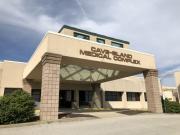Electrophysiology
What is electrophysiology?
 Electrophysiologists are cardiologists who specialize in the electrical functions of the heart. One of the keys to how your heart works is the network of electrical connections inside it. The heart is an organ that is roughly the size of your fist, and it is mostly made up of muscles. When the muscles of the heart squeeze in the right order, your heart pulls in oxygen-rich blood from your lungs and pushes that blood out to the rest of your body. The electrical connections in your heart are what cause its different parts to squeeze.
Electrophysiologists are cardiologists who specialize in the electrical functions of the heart. One of the keys to how your heart works is the network of electrical connections inside it. The heart is an organ that is roughly the size of your fist, and it is mostly made up of muscles. When the muscles of the heart squeeze in the right order, your heart pulls in oxygen-rich blood from your lungs and pushes that blood out to the rest of your body. The electrical connections in your heart are what cause its different parts to squeeze.
What do electrophysiologists treat?
When the electrical connections work correctly, you have a normal heartbeat. When they malfunction, the heart doesn’t beat as it should. It can beat too fast or too slow, or parts of the heart may beat at the wrong time. This is called an arrhythmia, and some types of arrhythmias are life-threatening.
Electrophysiologists can help determine if you have an irregular heart rhythm. Certain types of arrhythmias can be treated with medication while others can be treated with minimally invasive procedures. These procedures can change the route your heart’s electricity takes. Some heart rhythm problems can be treated with an implantable device, like a pacemaker.
Common buzzwords in this area:
- Cardiac Catheterization: A minimally invasive procedure in which a cardiologist inserts a catheter into a vein and threads it up to your heart.
- Ablation: Altering electrical pathways in your heart, aka arrhythmias.
- Pacemaker: A type of medical device that can send electricity to your heart to correct rhythm problems.






